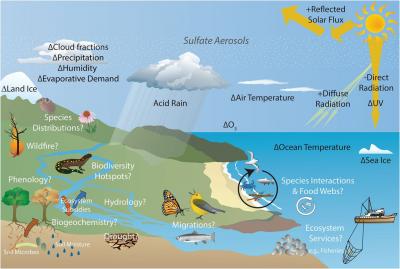Research Priorities for Studying Ecological Impacts of Geoengineering
As the effects of anthropogenic climate change become more severe, several approaches for deliberate climate intervention to reduce or stabilize Earth’s surface temperature have been considered. Solar radiation modification (SRM) is one approach that relies on reflecting a portion of incoming solar radiation by increasing Earth’s albedo. Few studies have investigated the potential impacts that SRM would have on terrestrial and marine ecological systems. Following on the heels of the release of a new report from the National Academies of Sciences, Engineering, and Medicine, titled Reflecting Sunlight: Recommendations for Solar Geoengineering Research and Research Governance, an interdisciplinary group of scientists, called the Climate Intervention Biology Working Group, reviewed current studies and identified gaps in knowledge about helpful and harmful predicted effects of stratospheric aerosol intervention (SAI), a well-studied and relatively feasible SRM scheme, on ecological systems.
Their analysis suggests that the implementation of different SAI scenarios could have contrasting effects on ecological systems because of the complex interactions between Earth’s climate system and living systems. While SAI could mitigate some or all of the projected surface temperature increases under climate change, other consequences of rising atmospheric CO2, including ocean acidification and vegetation physiological responses, would not be affected. These researchers advocate for a program of research aimed at addressing gaps in knowledge about SAI impacts on ecological systems. In addition, increased collaboration between ecologists and climate scientists would identify a common set of SAI research goals and improve communication about potential SAI impacts and risks with the public.
Climate intervention or geoengineering has been proposed to reduce some of the negative effects of climate change while countries continue pursuing efforts to reduce greenhouse gas emissions. One intervention approach, SRM, proposed to reflect some of the incoming solar radiation to cool Earth’s surface. While climate science research has applied models to predict direct climate effects should SRM be implemented, few studies have considered the consequences for ecological systems. Filling this knowledge gap is essential to understanding how potential implementation could alter the structure and functions of Earth’s biosphere, affecting biodiversity, ecosystem processes, and people. Through this perspective article, the Climate Intervention Biology Working Group aims to (1) raise awareness of this knowledge gap; (2) highlight initial work on ecological consequences of SRM; (3) identify potential ecological impacts and risks from implementation scenarios of a prominent SRM scheme, SAI; and (4) urgently advocate more research at the intersection of climate intervention and ecology, including exploring ways that ecological outcomes could steer SAI implementation scenarios.

